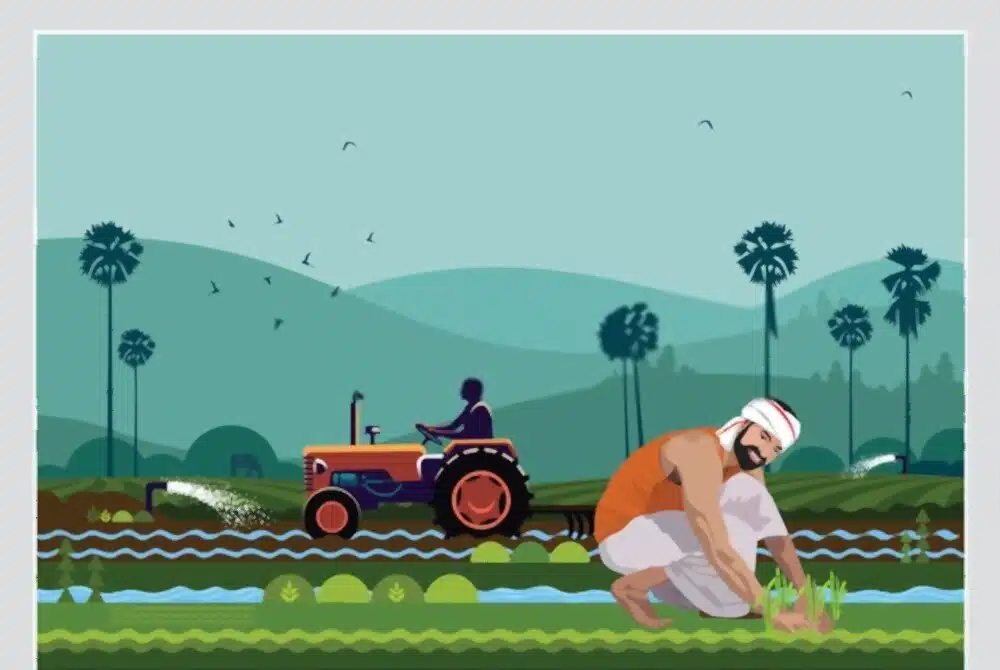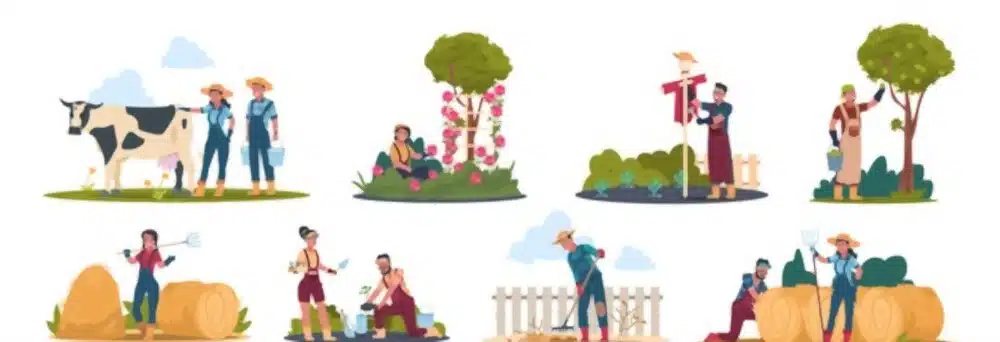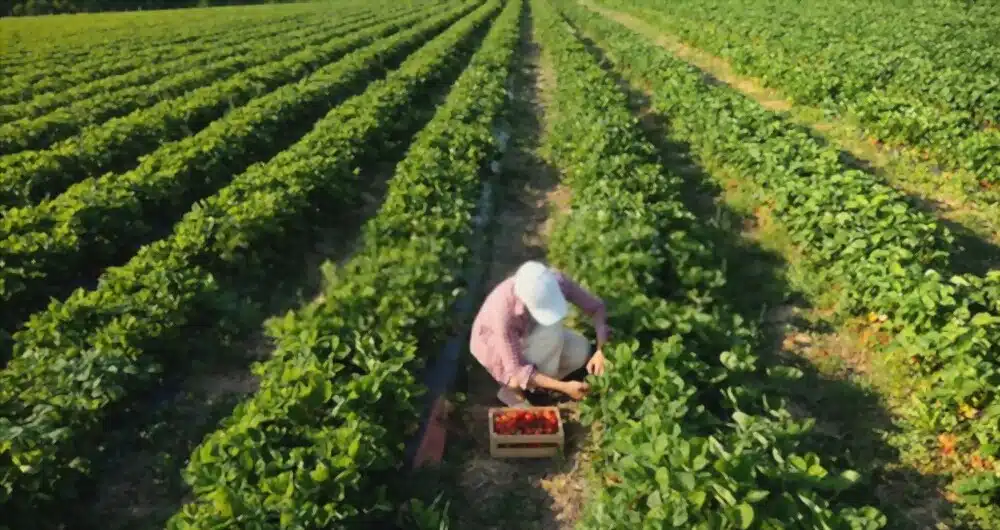
Agriculture has been the backbone of human civilization for centuries, and farmers have played an important role in feeding the world population. While many of us may take food for granted, it’s important to remember that without farmers, we wouldn’t have access to fresh produce or livestock. In this essay, we’ll explore why farmers are so important and how they contribute to our daily lives in ways that often go unnoticed.
Essay on Farmer- 100 Words
Farmers are the backbone of any nation. They wake up early in the morning and work very hard. The life of a farmer is not easy. They lead a very simple life. They sow seeds and grow crops. They supply food for humans and animals also. They play a very important role in the society. The hard work of farmers often goes unnoticed. Farmers often face many challenges in their lives. Climate change, droughts, floods and extreme weather patterns harm farmers. Despite these problems farmers grow crops for us. We should respect farmers for their hard work. let us not forget the importance of farmers
Essay about a Farmer- 150 Words
The life of a farmer can be both rewarding and challenging. From the early morning wake-ups to the late-night harvests, farmers work tirelessly. They provide us with all types of food. They face harsh weather conditions, pests, financial struggles, and physical labour.
The life of a farmer is not an easy one. It requires hard work, dedication, and patience. They spend long hours working under the sun bearing harsh weather conditions in order to ensure that everyone gets food. Farmers often have a very busy daily schedule. Their lives are closely tied to nature as they depend on it for their livelihood.
But despite many challenges, many farmers find great joy in their work. They take pride in seeing their crops grow. They find satisfaction in feeding their nation.
Farmers need to be knowledgeable about soil management techniques, irrigation methods, pest control measures and animal care practices. It is important we recognize the importance of farmers. They feed us every day. We can help farmers by supporting local agriculture initiatives.
Also Read:
- Essay on New Farm Bill 2020
- Essay on Farmers Suicide in India
- Essay on National Flag Adoption Day
- Life of a Soldier Essay
- Descriptive Paragraph on Einstein

Essay on Why are Farmers Important for School and College Students- 200 words
Farming has been an integral part of human society since the dawn of time. It provides us with food, clothing, and a variety of other products. Farmers provide us with materials necessary for our everyday life. Farmers are also responsible for maintaining the health and sustainability of our environment. Without them, we would be unable to survive. Farmers play an integral role in our world. Without them, the world would be a much different place indeed.
From planting and harvesting crops to caring for livestock, farmers play a crucial role in ensuring that we have access to fresh and nutritious food.
One of the most important works farmers do for us is cultivating sustainable agriculture practices. Farmers use innovative techniques like crop rotation, cover cropping, and integrated pest management to minimize the environmental impact of their farming activities.
In addition to providing us with food, farmers also support rural economies by creating jobs and supporting local businesses. They contribute significantly to our national economy by producing goods that are exported all over the world.
Overall, it’s evident that farmers make significant contributions not just in terms of feeding us but also in preserving our environment and sustaining our economy. Let’s appreciate them more!

Why Farmers are so Important Essay- 300 Words
From the moment we wake up and enjoy our breakfast to the time we tuck ourselves into bed at night, farmers have an impact on every aspect of our lives. From growing the food we eat to providing materials for clothing and shelter, their hard work and dedication nourishes and sustains us in countless ways.
The life of a farmer is made up of hard work and dedication. Their efforts are essential for the functioning of the society. Without farmers, many people would lack access to nutritious food and the ability to produce their own goods. All types of food industries run because of Farmers. They also provide necessary sustenance for animals and help maintain the environment by growing crops sustainably. In short, they are an integral part of our lives and communities.
The Importance of farmers can be better understood with the following points-
- Food Production: Farmers are responsible for growing and cultivating crops, fruits, vegetables, and livestock. They play a crucial role in ensuring an adequate and sustainable food supply for the population.
- Food Security: Farmers contribute to national and global food security by producing staple crops and essential food items. Their efforts help to reduce dependence on imported food and stabilize prices in the market.
- Economic Contribution: Agriculture forms a significant portion of the economy in many countries. Farmers generate income through the sale of agricultural products, contributing to economic growth and employment opportunities.
- Rural Development: Farmers are key contributors to rural development, as agricultural activities are often centered in rural areas. Their work helps create employment opportunities, supports local businesses, and strengthens rural communities.
- Environmental Stewardship: Farmers play a vital role in sustainable land management and conservation practices. Through responsible farming techniques, they can protect soil health, preserve biodiversity, and mitigate the impact of climate change.
- Cultural Heritage: Farming practices and traditions are deeply rooted in many cultures and communities. Farmers help preserve and pass on traditional knowledge, farming techniques, and cultural heritage from generation to generation.
- National and Global Trade: Agricultural exports contribute to a country’s trade balance and foster international relations. Farmers participate in global trade by exporting agricultural products, strengthening economic ties between nations.
- Innovators and Adaptability: Farmers constantly adapt to new technologies, techniques, and market demands. They serve as innovators, embracing advancements in agricultural practices to improve productivity and sustainability.
- Social Impact: Farmers provide a valuable service to society by ensuring food availability and contributing to the overall well-being of communities. Their work fosters a sense of connection to the land and promotes healthy lifestyles through access to fresh, nutritious food.
- Sustainable Development: Farmers have a significant role in achieving sustainable development goals by promoting responsible and environmentally friendly farming practices.
They contribute to a more sustainable future by balancing economic viability, environmental stewardship, and social well-being. So we should respect fermers
Essay on Why are Farmers Important for School and College Students- 400+ Words
As we sit down to eat our favorite meal, let’s take a moment to thank the farmers who made it possible. Farmers are the backbone of our food system and play a crucial role in providing us with fresh produce, meats, and dairy products. They work tirelessly under unpredictable weather conditions and struggle to keep up with ever-evolving market demands. In this blog post, we’ll explore why farmers are important for school and college students to understand. From the different types of farming to its benefits and drawbacks, we’ll dive deep into what makes farming such a vital profession in today’s society. So grab your fork and let’s dig in!
Why are farmers important?
Farmers are essential to our economy, society, and environment. They provide us with the food we eat, but their role goes much deeper than that. Farmers also help create jobs in rural areas and contribute significantly to a country’s gross domestic product (GDP). Without farmers, food scarcity would be an inevitable consequence.
Farming is not just about producing food; it also has significant environmental benefits. Farmers play an important role in preserving natural resources like water and soil by implementing sustainable farming practices. By using crop rotation methods or adopting precision agriculture techniques, they can reduce the use of fertilizers and chemicals that harm the environment.
Moreover, farmers are responsible for maintaining biodiversity on their lands by protecting wildlife habitats such as wetlands or forests. This helps prevent species from going extinct while providing opportunities for ecotourism.
In summary, farmers are critical to our well-being as a society since they provide us with sustenance while protecting the environment at large. Students should understand how vital this profession is and strive to learn more about its intricacies so that we can appreciate the hard work of those who grow our food every day!

The different types of farming
Farming is a diverse industry with various types of farming practices. Each type has its unique characteristics, methods, and benefits. Here are some different types of farming:
1) Subsistence Farming: This type involves producing enough food for personal or family consumption. It’s common in developing countries where people rely on their farms to survive.
2) Commercial Farming: In this type, farmers grow crops or raise livestock to sell for profit. Commercial farming is more prevalent in developed economies.
3) Organic Farming: Organic farming focuses on using natural fertilizers and pesticides instead of synthetic ones to reduce environmental pollution.
4) Aquaculture Farming: This practice involves raising fish and other aquatic animals in tanks/ponds for commercial purposes.
5) Hydroponic Farming: Hydroponics is the art of growing plants without soil but by suspending them in nutrient-rich water solutions.
Understanding the different types of farming helps us appreciate how farmers contribute to our economy and society at large. They provide us with essential products we need for survival while also preserving our environment through sustainable agricultural practices.

The Benefits of Farming
Farming has numerous benefits that can positively impact both the farmers and society as a whole. One of the primary benefits is that farming provides food security for people around the world. Farmers cultivate crops and livestock, which are essential to our daily diets.
Moreover, farming also helps to preserve natural resources such as soil, water, and biodiversity. Crop rotation techniques prevent soil depletion while integrated pest management practices reduce chemical use in agriculture.
In addition to this, farming creates job opportunities for rural communities leading to economic growth in these areas. It promotes social cohesion by bringing together community members through shared interests in agriculture and cultural traditions.
Farming also plays an important role in mitigating climate change by reducing carbon emissions through sustainable land-use practices such as conservation tillage, agroforestry systems or cover cropping.
Farms serve as habitats for wildlife which contributes towards maintaining healthy ecosystems. This helps ensure a balanced environment with diverse plant and animal species coexisting peacefully.
There are many benefits of farming that are vital to human welfare along with environmental sustainability making it a crucial component of economies worldwide.
The drawbacks of farming
The Impact on the Environment
Farming has an impact on the environment, which can be a concern. The use of pesticides and fertilizers can harm the soil, water, and wildlife. This can lead to soil degradation, water pollution, and negative effects on biodiversity.
Resource Intensive- Traditional farming methods often require a lot of land and resources. This can result in deforestation and further harm to biodiversity.
Physical Demands and Limited Access – Farming can be physically demanding, with long hours in tough conditions. Farmers in remote areas or with limited resources may have difficulty accessing healthcare and basic necessities.
Furthermore, farmers are often at the mercy of market forces beyond their control such as weather patterns or fluctuating prices for crops. This uncertainty can make it difficult for them to plan for the future and make investments in their businesses.
Despite these challenges, farmers continue to play a vital role in our society by providing us with food security and contributing significantly to local economies. It is important that we support sustainable practices that minimize environmental harm while also ensuring fair compensation for farmers who dedicate themselves tirelessly every day towards feeding us all.
Conclusion
Farmers play a crucial role in our society and are essential to our survival. They provide us with the food we need to survive and ensure that we have access to healthy, nutritious meals. Moreover, they contribute significantly to the economy by creating jobs and driving growth.
Despite facing numerous challenges such as climate change, rising costs of inputs, low market prices for their produce, among others; farmers remain committed to providing us with quality food products.
As students at school or college level studying agriculture or related subjects such as environmental science or biology it is important that you recognize the vital role that farmers play in our world today. You can consider volunteering on a farm during your free time or even pursuing a career in farming after graduation.
In summary, always remember: “No Farmers No Food”- so let’s appreciate all those who work tirelessly every day on farms across the globe.
FAQs-
1) Why are farmers important?
Farmers are crucial for several reasons:
1.Food Production: Farmers are the backbone of our food system. They grow and raise the crops and livestock that provide the essential food we consume daily. Without farmers, there would be a significant shortage of food, leading to widespread hunger and malnutrition.
2.Food Security: Farmers play a vital role in ensuring food security. By producing a diverse range of crops and livestock, they help maintain a stable and abundant food supply. Their work helps prevent food shortages and reduces dependence on imported food, promoting self-sufficiency in a country’s food production.
3.Economic Impact: Agriculture is a significant contributor to the economy, and farmers are key drivers of this sector. They generate employment opportunities, both directly and indirectly, in rural areas. Additionally, the agricultural industry supports related industries such as food processing, transportation, and retail, contributing to economic growth and stability.
4.Environmental Stewardship: Farmers play a critical role in environmental conservation. They implement sustainable farming practices to protect soil health, reduce water usage, minimize chemical inputs, and preserve biodiversity. By adopting sustainable agriculture techniques, farmers contribute to mitigating climate change and preserving natural resources for future generations.
5.Rural Development: Farmers are essential for the development and prosperity of rural communities. Their presence contributes to the social and economic fabric of rural areas, providing livelihoods, infrastructure development, and supporting local businesses. They help maintain the vitality of rural communities and preserve the cultural heritage associated with farming.
6.Knowledge and Innovation: Farmers possess a wealth of knowledge and expertise accumulated over generations. They continually innovate and adapt to changing conditions, incorporating new technologies and scientific advancements into their farming practices. Farmers’ knowledge and innovation contribute to the advancement of agricultural techniques, leading to increased productivity and sustainability.
In summary, farmers are important because they ensure food production and security, contribute to the economy, practice environmental stewardship, drive rural development, and bring knowledge and innovation to the agricultural sector. Their role is vital for sustaining communities, promoting food accessibility, and building a more sustainable and resilient future
2) Why are seasons important to farmers?
Seasons are crucial to farmers for the following reasons:
1.Crop Growth and Yield: Different crops have specific seasonal requirements for optimal growth and development. Seasons provide farmers with a predictable pattern of weather and temperature changes, which are essential for determining the appropriate time to plant, nurture, and harvest their crops. The timing of planting and harvesting directly impacts crop yields and overall agricultural productivity.
2.Water Availability: Seasons play a significant role in determining water availability for irrigation and crop needs. In many regions, rainfall patterns vary across seasons, with wet and dry periods. Farmers rely on the rainy season to replenish water sources, ensuring sufficient irrigation for their crops. Proper water management during different seasons is vital to prevent droughts, water scarcity, and crop failure.
3.Pest and Disease Management: Seasons influence the prevalence of pests and diseases in agricultural systems. Different pests and diseases thrive under specific climatic conditions. Understanding seasonal patterns helps farmers anticipate and manage pest outbreaks and diseases effectively. They can implement appropriate pest control measures, disease-resistant crop varieties, and timely crop protection practices.
4.Nutrient Cycling: Seasons impact soil fertility and nutrient cycling processes. For example, during fall and winter seasons, organic matter from crop residues and leaves decomposes, enriching the soil with essential nutrients. This natural process enhances soil health and provides a nutrient-rich environment for future crops. Farmers utilize these seasonal cycles to plan soil management practices, such as cover cropping and nutrient application, to maintain soil fertility.
5.Crop Rotation and Diversity: Seasons influence farmers’ decisions regarding crop rotation and diversification. By rotating crops seasonally, farmers can break pest and disease cycles, improve soil health, and optimize resource utilization. Different crops have varying seasonal requirements, and farmers leverage this knowledge to create a balanced and sustainable cropping system.
6.Market Demand and Seasonal Cycles: Consumer preferences and market demand often vary with the seasons. Certain crops are more in demand during specific seasons, such as fresh fruits and vegetables during the summer. Farmers need to align their planting schedules and crop choices with market demand to maximize profitability and meet consumer needs.
In summary, seasons are vital to farmers as they dictate optimal planting and harvesting times, influence water availability, guide pest and disease management strategies, affect soil fertility and nutrient cycling, facilitate crop rotation and diversification, and align with market demand. Understanding and working in harmony with the seasonal cycles are key to successful and sustainable farming practices.
3)How important are agronomists for farmers?
Agronomists play a crucial role in supporting farmers in various aspects of agricultural production and management. Their importance can be summarized as follows:
1.Crop Selection and Management: Agronomists provide expertise in crop selection based on factors such as soil conditions, climate, and market demand. They help farmers choose the most suitable crop varieties and guide them in implementing appropriate crop management practices, including planting techniques, nutrient management, pest and disease control, and irrigation strategies. This ensures optimal crop growth, productivity, and quality.
2.Soil Health and Fertility: Agronomists assist farmers in assessing soil health and fertility. Through soil testing and analysis, they provide recommendations on soil amendments, nutrient application, and soil conservation practices. By optimizing soil conditions, agronomists help farmers maintain soil fertility, prevent nutrient deficiencies or imbalances, and minimize soil erosion.
3.Pest and Disease Management: Agronomists play a vital role in helping farmers identify and manage pests and diseases that can significantly impact crop yields. They provide advice on integrated pest management (IPM) practices, which emphasize a combination of cultural, biological, and chemical control methods to minimize the use of pesticides and promote environmentally friendly approaches.
4.Technology and Innovation: Agronomists stay updated with the latest advancements in agricultural technologies and innovations. They introduce farmers to new tools, equipment, and precision farming techniques that can enhance productivity, efficiency, and sustainability. This includes the adoption of precision agriculture technologies, remote sensing, data analysis, and other digital tools that assist in decision-making and resource optimization.
5.Climate Change Adaptation: With the increasing challenges posed by climate change, agronomists help farmers adapt their practices to mitigate its impacts. They provide guidance on climate-resilient crop varieties, water management strategies, and conservation practices to cope with changing weather patterns, extreme events, and water scarcity.
6.Education and Training: Agronomists contribute to farmer education and capacity building by conducting training programs, workshops, and demonstrations. They disseminate knowledge on best agricultural practices, new technologies, and sustainable farming methods. Through extension services, agronomists bridge the gap between research and practical implementation, helping farmers stay informed and empowered.
In summary, agronomists are vital for farmers as they provide valuable expertise in crop selection and management, soil health and fertility, pest and disease management, technology adoption, climate change adaptation, and education and training. Their support enhances agricultural productivity, sustainability, and resilience, ultimately contributing to the success and profitability of farmers.